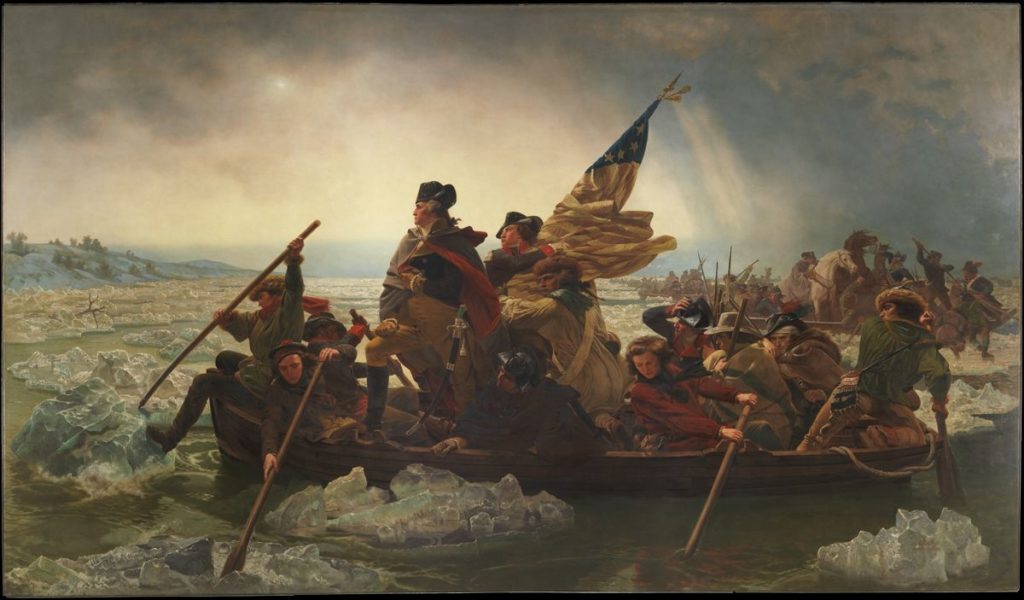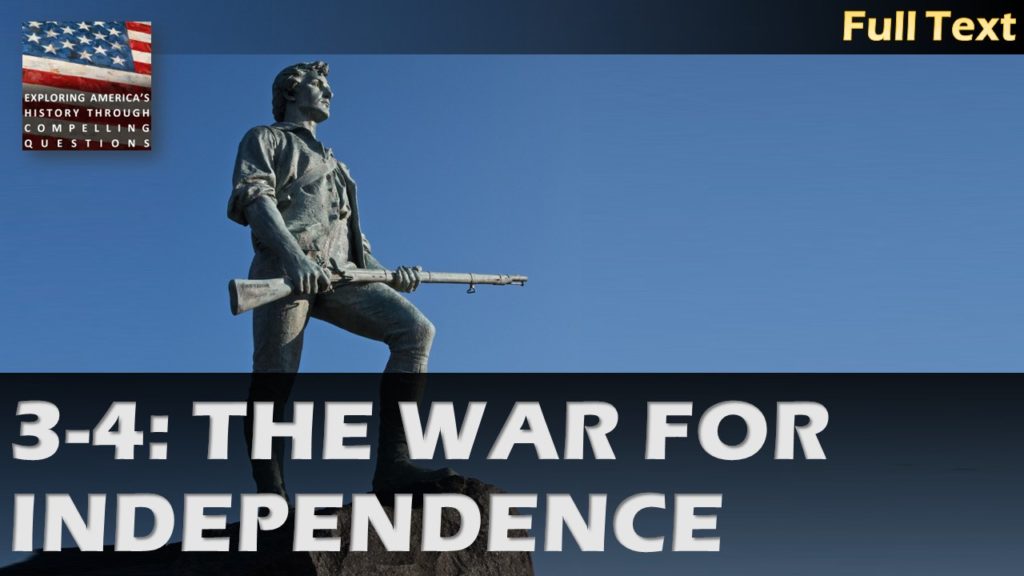
TRANSLATE
[google-translator]

OTHER VERSIONS OF THIS READING
INTRODUCTION
How could the Americans ever hope defeat the mighty British Empire in a military conflict? Americans faced seemingly impossible obstacles. When the guns fired at Lexington and Concord in 1775, there was not yet even a Continental Army. Those battles were fought by local militias. Except for a handful who had fought in the Seven Years War, few Americans had any military experience, and there was no method of training, supplying, or paying an army.
Moreover, a majority of Americans opposed the war in 1775. Many historians believe only about a third of all Americans supported a war against the British at that time. Further, the Colonies had a poor track record of working together.
All of these facts beg the question: how did the Americans ever win the war? (Which we know they did, of course, since we are not British citizens.) That is a relatively easy question to answer, as you will see. A series of factors came together at the right moments to make American independence possible.
A much more interesting question, and one that is more relevant today, is to consider the ability of powerful nations to rule distant lands. In the case of the American Revolution, Great Britain was at the height of its power and was trying to maintain control of its American colonies across the Atlantic. In modern times, the United States is the world’s most powerful nation and we have attempted to manage the affairs of distant nations such as Iraq and Afghanistan. We know that those endeavors were difficult and only partially successful.
What can the American Revolution tell us about this question? What do you think? Can powerful nations maintain control of distant territory?
STRENGTHS AND WEAKNESSES
The British seemed unbeatable. During the previous 100 years, the British had enjoyed triumph after triumph over powerful nations such as France or Spain. At first glance, the odds were clearly against the Americans. A closer look provides insight into how the underdogs emerged victorious.
Britain’s military was the best in the world. Their soldiers were well equipped, well disciplined, well paid, and well fed. The British navy dominated the seas. Funds were much more easily raised by the Empire than by the Continental Congress. Some of those funds were used to hire Hessian mercenaries from Germany who Britain hired to supplement their own army.
The Americans had tremendous difficulty raising enough funds to purchase basic supplies for their troops, including shoes and blankets. The British had a winning tradition. Around one in five Americans openly favored the Crown, with about half of the population hoping to avoid the conflict altogether. Most Native American tribes sided with Britain, who promised protection of tribal lands.
On the other hand, the Americans had many intangible advantages.
The British fought a war far from home. Military orders, troops, and supplies sometimes took months to reach their destinations. The British had an extremely difficult objective. They had to persuade the Americans to give up their claims of independence. As long as the war continued, the colonists’ claim continued to gain validity. The geographic vastness of the colonies proved a hindrance to the British effort. Despite occupying every major city, the British remained at a disadvantage.
American military and political leaders were inexperienced, but proved surprisingly competent.
The war was expensive and the British population debated its necessity. In Parliament, there were many American sympathizers. Finally, the alliance with the French gave Americans courage and a tangible threat that tipped the scales in America’s favor.
Americans were fighting for their rights, their independence and their liberty. This cause is much more just than waging a war to deny independence. In other words, Britain had to win, but the Americans simply had to not lose.
PATRIOTS, LOYALISTS, AND FENCE-SITTERS
It is impossible to know the exact number of American colonists who favored or opposed independence. For years, it was widely believed that one third favored the Revolution, one third opposed it and one third were undecided. This stems from an estimate made by John Adams in his personal writings in 1815. Historians have since concluded that Adams was referring to American attitudes toward the French Revolution, not ours.
The current thought is that about 20 percent of the colonists were Loyalists, those whose remained loyal to England and King George. The Loyalists were also known as Tories. Another small group in terms of percentage were the dedicated Patriots, for whom there was no alternative but independence.
Often overlooked are the fence-sitters who made up the largest group. With so many Americans undecided, the war became in great measure a battle to win popular support. If the Patriots could succeed in selling their ideas of revolution to the public, then popular support might follow and the British would be doomed. Even with military victory, it would have been impossible for the Crown to regain the allegiance of the people. Revolution would merely flare up at a later date.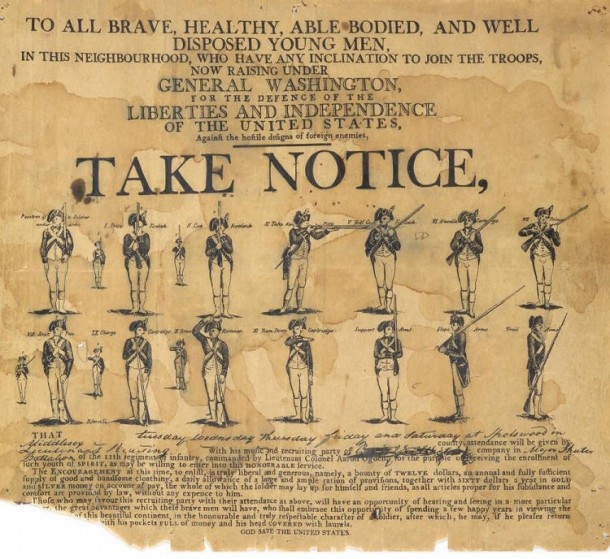 Primary Source: Newspaper Advertisement
Primary Source: Newspaper Advertisement
A notice that appeared in a Connecticut newspaper calling for recruits to join the newly formed Continental Army under Washington’s command.
The British understood the need to attract American popular support for the parent country, as well. Some colonists who were not persuaded by the political struggle joined the British for personal gain or military glory. Some joined out of loyalty to the Crown. They still believed themselves loyal British citizens. There were also many American farmers willing to sell their goods to the British for profit.
In the end, however, the Patriots won the war of propaganda and were far more successful attracting support. Committees of Correspondence persuaded many fence-sitters to join the patriot cause. Writings such as Thomas Paine’s “Common Sense” stirred a mew American nationalism.
Patriots subjected Loyalists to public humiliation and violence. Many Loyalists found their property vandalized, looted, and burned. The Patriots controlled public discourse. Publicly proclaiming sympathy for Britain was dangerous.
Families were sometimes divided over the revolution. Benjamin Franklin’s son, William, a Loyalist governor of New Jersey, supported the British effort during the war.
In the end, many Loyalists simply left America. About 80,000 of them fled to Canada or Britain during or just after the war. Because Loyalists were often wealthy, educated, older, and Anglican, the American social fabric was altered by their departure. American history brands them as traitors, but most were just trying to maintain the lifestyles to which they had become accustomed.
THE HOME FRONT
Most Americans did not actively participate in the revolution. During the war years, those Americans not involved in warfare were doing their best just trying to survive. Farmers continued to grow food, artisans continued to practice their trades, and merchants attempted to maintain their businesses. Despite efforts to carry on as usual, the entire social landscape was changing.
War disrupts economies and brings tremendous population dislocations. Woe came to families or farmers who found themselves in the way of advancing armies. Despite stringent warnings against such behavior from officers on both sides, farms and homes were often plundered. Soldiers took grain, livestock, or whatever goods they needed.
If citizens were thought to be colluding with the American military, their homes might be burned. At times, the homes of revolutionary firebrands or officers were set afire by a vindictive British army.
As the British entered major cities such as Boston, Philadelphia, and New York, many people fled to the countryside, looking for food and work. Traditional markets were disrupted. Farmers who one week sold their wares to their usual American customers might the next week be selling to an occupying British army.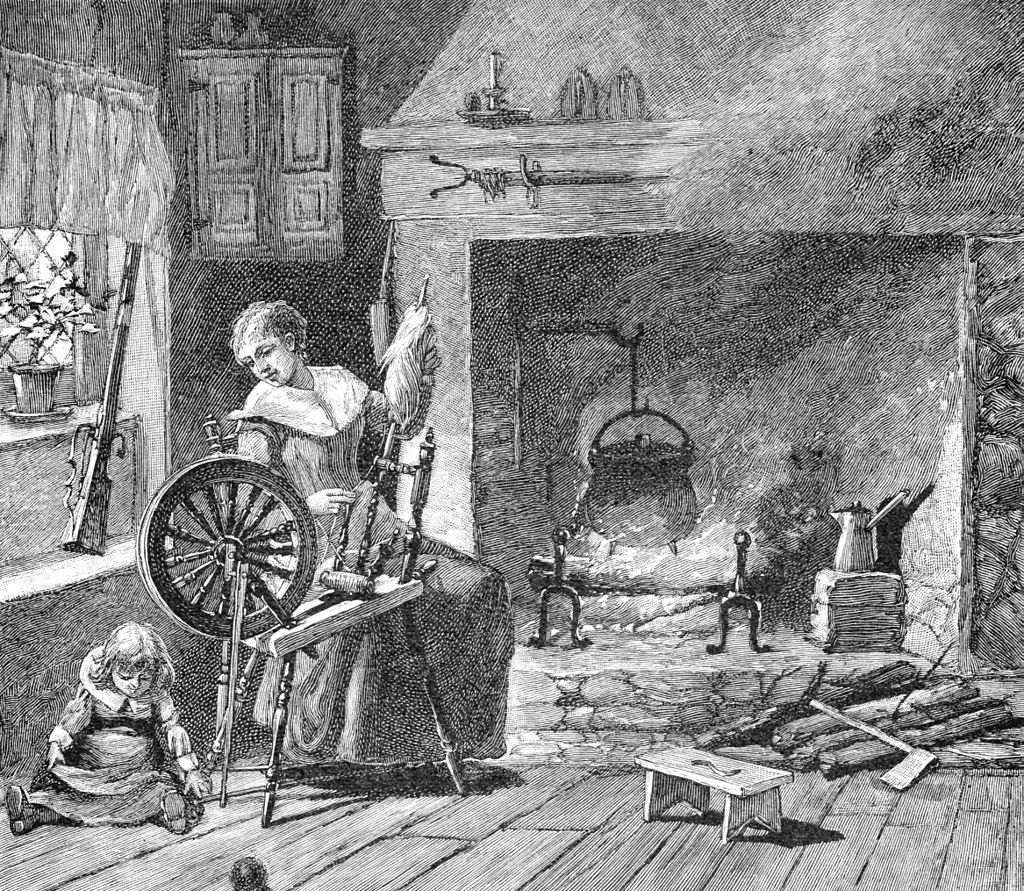 Secondary Source: Illustration
Secondary Source: Illustration
An image of a colonial Patriot woman taking care of her home and children, while also spinning threat to make homespun so that she would not have to purchase cloth from England.
The British blockaded American ports caused widespread unemployment. Almost anyone dependent on the foreign market, from shippers to merchants, was out of work. Both armies were sometimes followed by men and women willing to work in any way for a hot meal.
Some farmers and merchants hoped to profit from increased prices due to scarcity. Many sold their wares to the British army. Violence sometimes came in the wake of rising prices, and the Continental Congress tried to enact regulations to counter inflation throughout the Colonies. Despite their efforts, the Colonial economy was in shambles.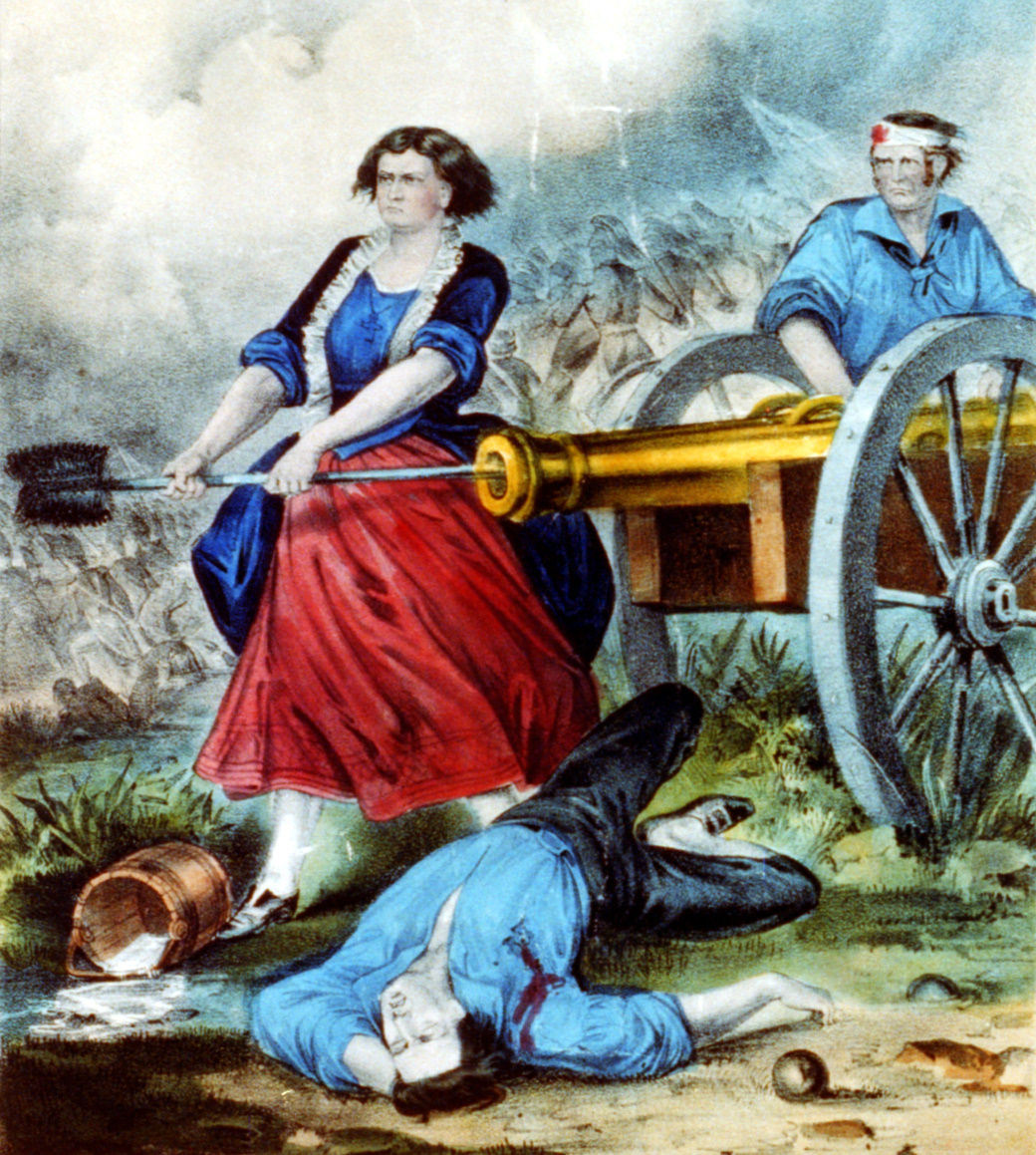 Secondary Source: Illustration
Secondary Source: Illustration
Molly Pitcher taking the place of her fallen husband at the Battle of Monmouth. Perhaps based on a composite of the deeds of numerous women, the story of Molly Pitcher was probably mostly based on the Mary Ludwig Hays, who was one of the women who carried pitchers of water to soldiers during battle.
The war had important impacts for women. Women stepped forth to fill holes left by fighting Continental soldiers. Women needed to perform tasks formerly reserved for their husbands, such as farming or running businesses.
These new and independent women of the house also had to stand up for themselves when confronted by both American and British armies. When militias appealed to the public for uniforms and food, homespun garments and farm crops came from patriotic women. And when British armies and soldiers appeared at homes being occupied by women, they did not always find a friendly face.
Some colonial women served as spies for Washington’s army, passing valuable information about troop locations and movements. Many men would have returned to bankruptcy after the war had it not been for the efforts of their spouses.
Wars are not merely fought on the battlefield. Even in the 18th century, successful campaigns were the hallmark of a concerted effort. By 1783, the entire American population seemed battle weary, from the foot soldier to the farmer’s wife. Their sacrifices helped secure freedoms for the generations that would follow.
EARLY BATTLES
The early stages of war, in 1775, can be best described as British military victories and American moral triumphs. The British routed the minutemen at Lexington, but the relentless colonists unleashed brutal sniper fire on the British returning to Boston from Concord.
In June 1775, the colonists failed to prevail at Bunker Hill, in Charlestown across the Charles River from Boston, but inflicted heavy casualties on a vastly superior military force. A year later, in 1776, Washington narrowly escaped when the British occupied New York City.
Washington led his army to a surprise victory the day after Christmas when he led his troops across the Delaware River in the middle of the night to ambush Hessians at Trenton, New Jersey. While the victory lifted the spirits of Patriots, it did not significantly impact the strength of the main British force.
Regardless, by 1777 the British occupied Philadelphia, the seat of the Continental Congress, and sent that body into hiding. The British also controlled New York City and pretty much had their way in the waters along the Eastern Seaboard. In fact, there was no Continental Navy to speak of at this time. Meanwhile, the British began mounting a southward attack from Canada into upstate New York. This threatened to cut New England off from the rest of the Colonies. Secondary Source: Painting
Secondary Source: Painting
A painting by the German-American artist Emanuel Leutze. It commemorates General George Washington during his famous crossing of the Delaware River on the night of December 25–26, 1776. The original was part of the collection at the Kunsthalle in Bremen, Germany, and was destroyed in a bombing raid in 1942, during World War II. Leutze painted two more versions, one of which is now in the Metropolitan Museum of Art in New York City. The other was in the West Wing reception area of the White House in Washington, D.C. Painted in 1851, it is famous, but not historically accurate.
THE BATTLE OF SARATOGA
The Battle of Saratoga was the turning point of the Revolutionary War. The scope of the victory is made clear by a few key facts: On October 17, 1777, 5,895 British and Hessian troops surrendered their arms. General John Burgoyne had lost 86% of the expeditionary force he had led triumphantly into New York from Canada in the early summer.
The divide-and-conquer strategy that Burgoyne presented to British ministers in London was to invade America from Canada by advancing down the Hudson Valley to Albany. There, he would be joined by other British troops under the command of Sir William Howe. Howe would be bringing his troops north from New Jersey and New York City.
Burgoyne believed that this bold stroke would not only isolate New England from the other American colonies, but achieve command of the Hudson River and demoralize Americans and would-be allies such as the French.
In June 1777, Burgoyne’s army of over 7,000 men departed from St. Johns on Lake Champlain, bound for Fort Ticonderoga, at the southern end of the lake. Half of his army were British troops and the other half were hired Hessians.
As the army proceeded southward, Burgoyne drafted and had his men distribute a proclamation that, among other things, included the statement “I have but to give stretch to the Indian forces under my direction, and they amount to thousands,” which implied that Britain’s enemies would suffer attacks from Native Americans allied to the British. More than any other act during the campaign, this threat and subsequent widely reported atrocities such as the scalping of Jane McCrea stiffened the resolve of the Americans to do whatever it took to assure that the threat did not become reality.
The American forces at Fort Ticonderoga recognized that once the British set up artillery on high ground near the fort, Ticonderoga would be indefensible. A retreat from the Fort was ordered, and the Americans floated troops, cannon, and supplies across Lake Champlain to Mount Independence.
Burgoyne continued his march towards Albany, but miles to the south a disturbing event occurred. Sir William Howe decided to attack the Rebel capital at Philadelphia rather than deploying his army to meet up with Burgoyne and cut off New England from the other Colonies. Meanwhile, as Burgoyne marched south, his supply lines from Canada were becoming longer and less reliable.
It was a tragic miscalculation on the part of the British.
In early August, word came that a substantial supply depot at Bennington, Vermont, was alleged to be lightly guarded, and Burgoyne dispatched German troops to take the depot and return with the supplies. Stiff resistance was encountered, however, and American general John Stark surrounded and captured almost 500 German soldiers. One observer reported Bennington as “the compleatest Victory gain’d this War.”
Burgoyne realized, too late, that the Loyalists who were supposed to have come to his aid by the hundreds had not appeared, and that his Native American allies were also undependable.
American general Schuyler proceed to burn supplies and crops in front of Burgoyne’s advancing army so that the British were forced to rely on their ever-longer and more and more unreliable supply line to Canada rather than being able to feed themselves on food they gathered from farms as they travelled. On the American side, General Horatio Gates arrived in New York to take command of the American forces.
By mid-September, with the fall weather reminding Burgoyne that he could not winter where he was and needed to proceed rapidly toward Albany, the British army crossed the Hudson River and headed for Saratoga. On September 19, the two forces met at Freeman’s Farm north of Albany. While the British ended the battle as “masters of the field,” they sustained heavy losses.
In late September and during the first week of October 1777, Gate’s American army was positioned between Burgoyne’s army and Albany. On October 7, Burgoyne took the offensive. The armies met south of the town of Saratoga, and Burgoyne’s army was broken. 86% of Burgoyne’s command was captured.
The victory gave new life to the American cause at a critical time. Americans had just suffered a major setback the Battle of the Brandywine along with news of the fall of Philadelphia to the British. One American soldier declared, “It was a glorious sight to see the haughty Brittons march out & surrender their arms to an army which but a little before they despised and called paltroons.”
The American victory at Saratoga was important for two reasons. First, it prevented the British from dividing the colonies. Because Burgoyne failed at Saratoga and Howe stopped his northern advance, the New England colonies and the middle and southern colonies remained in contact..
Second, the success at Saratoga gave France the confidence in the American cause to enter the war as an American ally. Later American successes owed a great deal to French aid in the form of financial and military assistance. Secondary Source: Painting
Secondary Source: Painting
An artist’s rendition of General Washington praying while at Valley Forge. Uncommon for his times, Washington, exhibited religious toleration, while he attended services of different denominations, and suppressed anti-Catholic celebrations in the Army. Washington permitted Jews, Muslims, Christians of any denomination, and atheists to work at Mount Vernon. While president he gave speeches on religious toleration. Washington was educated in and adhered to the Anglican-Episcopal church, while he believed in the fundamental doctrines of Christianity, with no indifference to other forms of Christianity.
VALLEY FORGE
American spirits reached a low point during the harsh winter of 1777-78. British troops had marched triumphantly into Philadelphia the previous autumn. Philadelphia was the largest city in the Colonies and the seat of political power. The Continental Congress had flee west, first to Lancaster then to York.
Washington’s army spent the summer of 1777 fighting a string of losing battles. The Americans harassed the British army in skirmishes and minor battles for much of the fighting season. In the fall, the Americans showed pluck at the Battle of Brandywine in September and the Battle of Germantown in October. Yet the Americans were unable to keep the British out of Philadelphia.
In December, Washington marched his tired, beaten, hungry and sick army to Valley Forge, Pennsylvania, a town about 20 miles northwest of British-occupied Philadelphia. From Valley Forge, Washington could keep an eye on General Howe’s British army ensconced in Philadelphia.
At Valley Forge, there were shortages of everything from food to clothing to medicine. Washington’s men were sick from disease, hunger, and exposure. The Continental Army camped in crude log cabins and endured cold conditions while the Redcoats warmed themselves in colonial homes. The Patriots went hungry while the British soldiers ate well.
General Washington was upset that local farmers were hoarding much-needed food waiting to earn higher profits in the spring. Some farmers even secreted grain into Philadelphia to feed the British army, who paid in gold or silver. With each passing night came more desertions. Washington grew privately disgusted at the lack of commitment of his so-called patriot fighters.
Then there was the grumbling of some in Congress and among some of Washington’s own officers. Washington’s leadership skills were openly questioned. Many said General Horatio Gates was better-suited to leading the army. After all, hadn’t he scored a major victory in October at the battle of Saratoga. Within the environment of cold, deprivation, and rebellion, how long could Washington and his army endure?
Terms of enlistment were ending for many soldiers in Washington’s army and many chose to go home rather than suffer through the winter, not knowing if they would have any better chance of success on the battlefield the coming summer. The General wondered if he would even have an army left when the spring thaw finally arrived.
Help came in the form of a Prussian volunteer, Baron von Steuben. The military leader was aghast at the lack of American discipline. At Washington’s urging he trained the Continental Army, Prussian-style. The troops slowly became more professional. Among the soldiers who remained, confidence grew.
Over the course of the winter, the weather improved somewhat. Food trickled in from the surrounding countryside. Many wives of soldiers spent time at Valley Forge over the winter. Washington was able to quash those who questioned his leadership abilities.
The Continental Army had arrived at Valley Forge in the fall of 1777 with about 12,000 men in its ranks. Death claimed approximately a quarter of them before spring arrived. Another thousand did not reenlist or deserted. However, the army that remained was stronger. They were fewer, but more disciplined. They were weary, but firmly resolved.
The next year, 1778, brought greater fortune to the American cause. While Washington froze at Valley Forge, Benjamin Franklin was busy securing the French alliance. The course of the war in the coming years would be different indeed.
BENEDICT ARNOLD
Benedict Arnold is best remembered as a traitor; an American patriot who spied for the British during the American Revolution. But there is more to his story than this sad event.
Arnold was a fierce patriot during the Stamp Act crisis and the early years of the American Revolution. During the battles of Lexington and Concord, Arnold worked with Ethan Allen to capture Fort Ticonderoga and was named a colonel.
As a member of George Washington’s Continental Army, he led a failed attack on Quebec, but was nonetheless named brigadier general in 1776.
His next big moment came at the Battle of Saratoga. Here, Benedict Arnold was instrumental in stopping the advance of the British and in obtaining the surrender of British General John Burgoyne. During the Battle of Freeman’s Farm, Arnold’s leg was severely wounded when pinned beneath his horse.
Over the next two years, Benedict Arnold remained a patriot, but was upset and embittered at what he felt was a lack of his recognition and contribution to the war. In 1778, following British evacuation of Philadelphia, George Washington appointed Arnold military commander of the city.
This is where the story gets interesting.
In Philadelphia, Benedict Arnold was introduced to and fell in love with Margaret “Peggy” Shippen, a young, well-to-do loyalist who was half his age. Ms. Shippen had previously courted John André, a British spy who had been in Philadelphia during the occupation as the adjutant to the British commander in chief, Sir Henry Clinton. It is believed that Peggy introduced Arnold to André.
Meanwhile, Benedict Arnold’s reputation while in Philadelphia was beginning to tarnish. He was accused of using public wagons for private profit and of being friendly to Loyalists. Faced with a court-martial for corruption, he resigned his post on March 19, 1779.
Following his resignation, Arnold began a correspondence with John André, now chief of British intelligence services. But Arnold had also maintained his close relationship with George Washington and still had access to important information. Over the next few months Benedict Arnold continued his talks with André and agreed to hand over key information to the British. Specifically, Arnold offered to hand over the most strategic fortress in America, West Point, a fort on the Hudson River that prevented the British from travelling freely between New York City and Canada. Primary Source: Map
Primary Source: Map
A map of the fortifications at West Point along the Hudson River. The chain stretching across the river to prevent the passage of ships is clearly visible.
Arnold and André finally met in person, and Arnold handed over information to the British spy. But, unfortunately for both men, André was caught and Arnold’s letter was found. George Washington, was heartbroken over the news of his friend’s treachery.
While Benedict Arnold escaped to British-occupied New York, where he was protected from punishment. John André was less lucky. He was captured by American forces and executed for spying.
Benedict Arnold was named brigadier general by the British government and sent on raids to Virginia. Following Cornwallis’s surrender at Yorktown in 1781, Arnold and his family sailed to Britain with his family. He died in London in 1801.
THE FRENCH ALLIANCE
Nowhere was the victory at Saratoga more noted than in France, which had been tentative in its efforts to assist the Americans. France’s interest in the American fight for independence stemmed from France’s humiliating defeat during the Seven Years War at the hands of its ancient enemy, England.
As early as 1774, Charles Gravier, comte de Vergennes, the French foreign minister, sent secret emissaries to explore the American colonists’ commitment to independence. In the spring of 1776, Congress dispatched Silas Deane to France as a secret commercial agent to see if he could make arrangements for the purchase of military supplies on terms of credit. Deane also made inquiries into possible French political and even military assistance.
The Continental Congress’s official diplomatic mission to Europe, led by none other than Benjamin Franklin, arrived in Paris in the fall of 1776, but did not make much headway. At the time, the patriot cause looked like it had little chance of success. Nonetheless, Franklin was the toast of the town. Always popular with women, he wore coonskin caps and traditional backcountry American clothing to court, making himself a bit pop icon in the French capital. His personality proved to be important not just in securing a declaration of independence in America, but also in securing French support during the war.
Watchful waiting by French diplomacy came to an end when the news of the surrender of Burgoyne’s army at Saratoga reached Paris on December 4, 1777. The American victory caused a reversal of British policy toward the Americans.
Lord North’s government immediately prepared to send to the America a mission with an offer of peace on the basis of home rule within the Empire — something that the Colonies would have been only too glad to accept in 1775.
This diplomatic move became known to Vergennes, and he was alarmed that a peace between the parent country and the American rebels might be a real possibility. Two Franco-American treaties were rapidly concluded. The first was a treaty of amity and commerce, which bestowed most-favored nation trading privileges and contained cooperative maritime provisions.
The second was a treaty of “conditional and defensive alliance.” It provided, among other things, that in case war should break out between France and Great Britain as a result of the first treaty, France and America should fight the war together, and neither would make a peace or truce with the enemy without the formal consent of the other. Nor would they “lay down their arms until the Independence of the united states shall have been formally or tacitly assured by the Treaty or Treaties that shall terminate the War.”
The American war continued, as France desired. France and Britain drifted into hostilities without a declaration of war when their fleets off Ushant off the northwest coast of France on June 17, 1778. A French expeditionary force arrived in the United States in 1780. The French alliance proved to be decisive for the cause of American independence.
YORKTOWN
The outlook for General Washington and the Americans never looked better. Although the American military was still enduring losses in 1780, the French were making a difference. The French navy had disrupted the British blockade. French commanders such as Gilbert du Motier, Marquis de Lafayette and Jean-Baptiste Donatien de Vimeur, comte de Rochambeau earned the respect and admiration of the American troops.
Although, the British occupied much of the South, they still had not been able to mobilize the local Loyalists. Grumbling in England grew louder over the war’s expense and duration. The morale of Washington’s men was improving. The war was by no means over, but the general had reason to be optimistic.
The year 1781 found a large squadron of British troops led by Lord Cornwallis at Yorktown, Virginia. Cornwallis hoped to keep his men in the Chesapeake town until fresh supplies and reinforcements could arrive from Britain. The French and the Americans conspired to capture the British before that could happen.
A French naval unit led by Admiral de Grasse headed north from the West Indies. Washington’s army was stationed near New York City at the time. Along with a French unit from Rhode Island, Washington’s troops marched over 300 miles south toward Yorktown. Along the way, he staged fake military maneuvers to keep the British off guard.
When Washington reached Virginia, Americans led by Lafayette joined in the siege. The French navy kept the British out of Chesapeake Bay until Cornwallis was forced to surrender his entire unit of nearly 8,000 troops on October 19, 1781.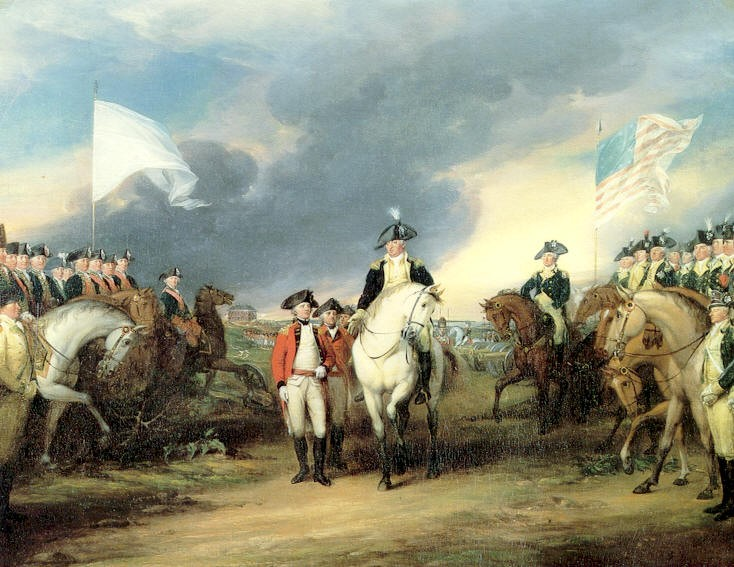 Secondary Source: Painting
Secondary Source: Painting
The Surrender of Lord Cornwallis by John Trumbull. The painting was completed in 1820, and hangs in the rotunda of the United States Capitol in Washington, DC. The painting depicts the surrender of British Lieutenant General Charles, Earl Cornwallis at Yorktown, Virginia on October 19, 1781, ending the Siege of Yorktown. On the right are American officers beneath the Stars and Stripes; among them are the Marquis de Lafayette and Colonel Jonathan Trumbull, the brother of the painter. General Washington, riding a brown horse, stayed in the background because Cornwallis himself was not present for the surrender. The Comte de Rochambeau is on the left center on a brown horse.
THE TREATY OF PARIS
Despite the American victory, the British military continued to fight, but the Battle of Yorktown turned the British public against the war. The following March, a new Parliament was elected which favored peace and negotiations began in earnest.
Benjamin Franklin, John Adams, and John Jay met with the British in Paris an in the Treaty of Paris of 1783 the British agreed to recognize American independence as far west as the Mississippi River. Americans agreed to honor debts owed to British merchants from before the war and to stop persecuting British Loyalists.
CONCLUSION
We know that the David and Goliath story of the Revolutionary War turned out in the Americans’ favor, but that was not at all certain at the outset. The minutemen who fired the first shots at Lexington, and the Founding Fathers who put their names to the Declaration of Independence a year later, were taking an enormous risk.
Britain, too, was taking a risk. They were balancing the benefits of having colonies as part of their empire against the cost of maintaining that relationship. Give the level of American hostility, or at least apathy, toward British rule, it is a wonder that the King and Parliament ever thought they would be able to bring the Americans happily back into the fold.
Perhaps we can learn something from our own experience. Perhaps military and economic might are not the only factors that matter. What do you think? Can powerful nations maintain control of distant territories?
CONTINUE READING

SUMMARY
BIG IDEA: The War for Independence was long and difficult. Eventually with the help of the French, Washington’s army was able to force the British to surrender and recognize American independence.
The British and Americans started the War for Independence with distinct strengths and weaknesses. The British were a powerful nation with the world’s largest army and navy. The Americans knew the territory and were fighting a war for a cause. The British had to win. The Americans simply had to not lose and last long enough for the British to tire of the fight.
About 1/3 of Americans were patriots. About 1/3 were loyalists. Another 1/3 had no particular preference. After the war, many loyalists were treated badly, lost their property, and moved to Canada.
The economy and the lives of citizens were interrupted by the conflict. Homes were burned and farms plundered. The British blockaded American ports.
Women supported the war by making clothing and by providing support services to the Continental Army, most famously as spies. They also took over the running of farms and businesses while their husbands were in the army.
The battles of the War for Independence were mostly victories for the British. In the early years of the war the Americans managed to resist and survive without complete destruction, which served as a moral victory and encouraged perseverance.
The British wanted to split the Southern Colonies from New England by controlling the Hudson River Valley in New York. This did not go well as the Americans defeated the British at Saratoga, the turning point of the war. The victory at Saratoga prevented the British from capturing all of New York and also convinced the French to join the war in support of the Americans.
George Washington’s army spent the Winter of 1777 at Valley Forge where they learned tactics from European noblemen who came to help the Americans.
Benedict Arnold became America’s first great villain by trying to turn over the fort at West Point to the British. His plot was uncovered and he fled.
The French provided critical support at the end of the war by blocking the British escape from Yorktown with their warships. Washington’s army forced the British to surrender.
The Treaty of Paris of 1783 concluded the war. Britain recognized American independence and gave the United States all territory south of Canada and west as far as the Mississippi River.

VOCABULARY

LOCATIONS
Valley Forge: Location in Pennsylvania of the Continental Army’s encampment during the winter of 1777-78. There was enormous suffering due to the cold, lack of food, medicine and clothing. Many American troops left but those that stayed formed a strong fighting force.
West Point: Fort in New York along the Hudson River. It was a strategic defense preventing the British from dividing the colonies. Benedict Arnold tried to turn over the fort, but his plan failed.
![]()
PEOPLE AND GROUPS
Hessian: German soldiers hired by the British to fight in the Revolutionary War. They were especially despised by the Patriots.
Loyalists: Americans who opposed independence. They were also called Tories.
Tories: Americans who opposed independence. They were also called Loyalists.
Patriots: Americans who supported independence.
Horatio Gates: American general at Saratoga.
Baron von Steuben: Prussian (German) officer who came to American and helped train the Continental Army.
Benedict Arnold: American general who helped win the Battle of Saratoga. Later he became a traitor and tried to turn over the fort at West Point to the British.
John André: British spy who was captured and hung by the Americans.
Marquis de Lafayette: French officer who came to support the Continental Army. He became a good friend of George Washington.
Rochambeau: French officer who, along with Lafayette, came to support the Continental Army.
Lord Cornwallis: British general who surrendered at Yorktown.
![]()
KEY IDEAS
Homespun: Cloth and clothing made a home by American women during the Revolution. Making this was considered the patriotic duty of women who supported the boycott of British products.
British Strategy: British plan to divide the colonies with a pincer action. Bergoyne would lead his troops south from Canada and Howe would lead his troops north from New York. The plan failed when Howe stopped to attack Philadelphia and Bergoyne was defeated at Saratoga.
French Alliance: Agreement between France and the United States brokered by Benjamin Franklin. As a result, the French supported the Americans, especially with their navy, and helped defeat the British at Yorktown.
![]()
EVENTS
Bunker Hill: Battle in June of 1775 across the Charles River from Boston between Patriots and British troops. It was a British tactical victory, but Americans were able to inflict high casualties on the much larger British force.
Crossing the Delaware: Famous attack led by George Washington in 1776 against Hessian troops in Trenton, New Jersey. It was a surprise attack and an important victory for the fledgling American army.
Battle of Saratoga: Turning point battle of the Revolutionary War in 1777. After the Americans showed that they were able to defeat the British on the battlefield, the French agreed to support the American cause.
Yorktown: Final battle of the Revolutionary War. George Washington was able to prevent a land escape and the French fleet prevented British army from evacuating. Cornwallis was forced to surrender.
![]()
TREATIES, LAWS & POLICIES
Treaty of Paris of 1783: Agreement between Britain and the United States that ended the Revolutionary War. Britain recognized American independence and gave the United States all the territory west to the Mississippi River.

